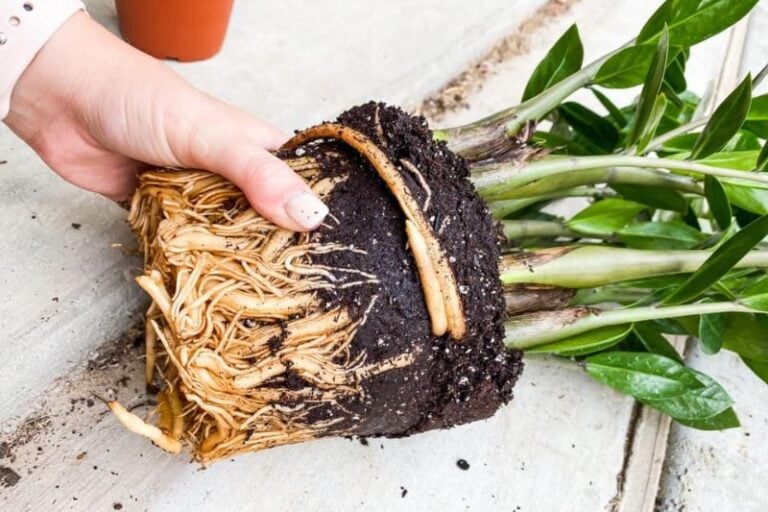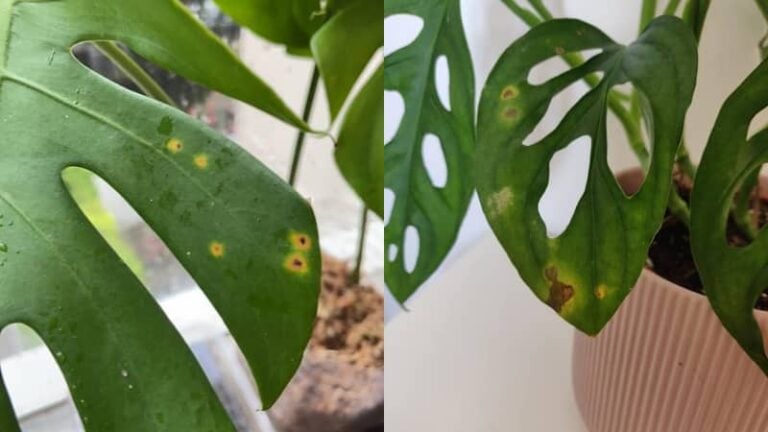I don’t know about you, but I can’t go one day without my cup of coffee in the morning.
Though if I had to give my basil the same amount that I drink, I don’t think it would be too impressive.
Basil can certainly benefit from coffee grounds but the question is how much you should give to it.
Like the rest of the world, basil does indeed like coffee. Coffee grounds provide the basil with beneficial nutrients, deters pests, prevents certain fungal diseases, and increases water retention. But this is only the tip of the iceberg.
Continue reading to find out more about using coffee grounds for your basil.
Contents
- Are Coffee Grounds Good for Basil?
- How Much Coffee Should You Add to Your Basil?
- How Often Should I Put Coffee Grounds on My Basil?
- Best Ways to Use Coffee Grounds on Basil
- Benefits of Using Coffee Grounds
- Problems with Using Coffee Grounds
- Watering with Leftover Coffee
- A Cup of Coffee Ground Compost Tea, Anyone?
Are Coffee Grounds Good for Basil?
Simply put, coffee grounds are good for basil. It’s beneficial in many ways, though use it sparingly.
Using it incorrectly or too frequently will have unsatisfactory, adverse effects.
Basil grows pretty easily, it only requires a warm environment, fertile soil that contains organic materials, good sunlight, and lots of water.
Potting soils don’t always contain all of the necessary nutrients that a plant needs for growing; even when it does, plants absorb these nutrients over time.
That is why plants need fertilizer and using coffee grounds (an organic product), will serve this purpose.
Tip: If you think that coffee grounds are way too harsh or acidic for your soil when you brew the coffee, the acidity is actually removed. All that remains are the nutrients that will help your plant to grow.
How Much Coffee Should You Add to Your Basil?
Like all things, it is best to start in moderation. Start by using a level tablespoon of grounds, once per week.
If your basil shows positive growth, you can continue this method. If not, then it is best to change the amount.
Grounds that you add to your basil should be roughly 5% of the total soil volume.
How Often Should I Put Coffee Grounds on My Basil?
Use the ‘once per week’ approach initially. You need to carefully watch your basil to see how it reacts to the coffee grounds.
If you notice any decline, adjust the number of coffee grounds, as well as how frequently you add them to the soil.
Best Ways to Use Coffee Grounds on Basil
Composting using Coffee Grounds
Composting involves the decomposition of natural waste, ie. recycling organic materials, through the anaerobic method.
The result is a dark, nutritious material that you can use as a fertilizer for plants.
Adding compost to soil helps it retain more nutrients and water, thus improving overall health.
When it comes to composting, there are two types: brown material (high in carbon) and green material (high in nitrogen).
Coffee ground’s high nitrogen content means that it is a green material, even though brown in color.
When creating your compost pile, it’s vital that you have the correct ratio of 4-to1 brown to green material.
If you add too much green material, your compost heap will begin to stink, and if you have too much brown material, it won’t heat up. Easy enough to remember, right?
Green materials include:
- Eggshells.
- Animal Manure (cow, sheep, chicken, horse, etc.)
- Fruit and Vegetable Scraps.
- Grass Clippings.
- Coffee Grounds and Tea Bags.
- Trimmings from plants.
Brown materials include:
- Paper (paper plates, coffee filters, writing paper, newspaper)
- Sawdust.
- Straw.
- Bark, twigs, branches.
- Corn Stalks.
Coffee Grounds as Organic Fertilizer
Thinly sprinkle used coffee grounds onto the soil of your basil plant, and then work it into the soil.
This is a cheap, and environmental-friendly way to give the soil a nutrient boost.
Bear in mind that because coffee grounds are a slow-release fertilizer, they won’t immediately release nitrogen into the soil.
Coffee grounds are ideal for fertilizing basil plants because they offer the following nutrients:
- Nitrogen (2.28%)
- Phosphorous (0.06%)
- Potassium (0.6%)
Coffee grounds also contain micronutrients: boron, calcium, copper, iron, magnesium, and zinc.
Worms are also attracted to coffee grounds because it is easy for them to consume and it helps their gut grind down food.
Worms, especially earthworms, are incredibly beneficial in helping plants thrive.
They help to increase air and water-flow in soil, and they break down organic matter that plants will use.
Mixing Coffee Grounds with Mulch
Mix your brewed coffee grounds with other organic materials before using it as a mulch, ideally mix it with compost.
Coffee grounds are made up of very fine particles and these are prone to locking together.
So using them alone as mulch will create a water-resistant barrier, and your plant will suffer from dehydration.
Once you have created an effective mulch, spread it over the top layer of soil in your basil plant.
One to two inches should be more than enough to form a good, thick layer.
Adding Coffee Grounds to Potting Mix when Repotting
Coffee grounds as organic material will release their nutrients slowly during decomposition.
This means that you can use it as an SRF (slow-release fertilizer) when you mix it with your normal potting soil.
This can provide a sustained source of nutrients for your basil for up to six months.
Coffee Grounds as Compost Tea
Take a sock and stuff it full of used coffee grounds and let it steep in a 5-gallon bucket of water for a few days.
Make sure that the water is non-chlorinated; either use rainwater or let tap water stand out for 24 hours beforehand.
Once the tea is ready, you can use this as a liquid fertilizer for your basil and other plants.
You can also pour some into a spray bottle and use that to lightly spray the leaves and stems of your basil.
Using ‘Drip Feeding’ Method
Drip feeding, (or drip irrigation), is a watering method that allows water to ‘drip’ slowly to the roots of plants.
It minimizes evaporation by directly supplying water to the root zone. This is mainly used for large plants and fields that require a lot of water.
You can make your DIY drip feeder and use coffee ground compost tea instead of water.
Tip: Make your own DIY drip irrigation system for your basil by following the steps in this university study.
Coffee Grounds and Seedlings
You wouldn’t give a baby coffee to drink… would you? While using coffee grounds is great for your adult plant, adding them to baby plants is a massive no-no.
Avoid using coffee grounds on seeds and seedlings because it can inhibit their germination and growth.
Benefits of Using Coffee Grounds
Benefits of using coffee grounds:
- It’s an excellent source of nitrogen (C/N ratio of 20-1).
- Acts as a natural pest repellent (snails and slugs particularly hate it).
- Improves soil structure and tilth.
- The pH level is near neutral (6.5 – 6.8 pH).
- Grounds don’t “go bad” over time.
- Has roughly 2% nitrogen by volume.
- Works as a fertilizer, compost, and mulch.
- Potential to absorb heavy metals in soil.
Prevents Diseases
Coffee grounds are antimicrobial, meaning it kills microorganisms (bacteria, viruses, fungi, and protozoans).
Adding it to your compost pile can help prevent some fungal diseases from growing. It also affects dangerous bacterias, like E.coli.
Deters Pests
There are some compounds in coffee, like caffeine and diterpenes, that can be toxic to bugs. These compounds work to deter beetles, mosquitoes, and fruit flies.
Other plant-eating pests like snails and slugs, don’t enjoy crawling off the grounds, as it sticks to their bodies.
Problem with ants crawling over your compost pile? Sprinkle those grounds all around.
Coffee grounds are effective at repelling them because they don’t like the strong smell that brewed coffee grounds emits.
Improves Soil Quality
As we established earlier, coffee grounds are a great source of nitrogen, so adding it to your soil can definitely increase the soil tilth.
Water Retention Capacity
SCG (Spent Coffee Grounds) can increase the amount of water that soil can hold onto. The fine particles act like a sponge that can store moisture in the soil.
Improves Drainage Capacity
Coffee grounds, an organic material, when added to the soil can improve soil health by improving aeration, water retention, and drainage.
Keeps Pets Away
I love animals, currently parent to two cats and a dog – but oh, how I HATE it when they mess with my plants.
From digging them up to eating them or drinking their water, to using them as their personal toilet.
Using coffee grounds is a natural way to deter fur babies from your precious plants.
Warning: Caffeine is toxic to cats and dogs, so be mindful of the number of coffee grounds you use and where you use it. Be it neighborhood cats, or your own, you wouldn’t want to cause them any harm.
Increases Soil Acidity
While many reports suggest using brewed coffee grounds will increase the acidity in the soil.
Some research says the high acidity is actually in the coffee itself, and not in the grounds.
Brewed coffee grounds have a near-neutral pH level of 6.5 – 6.8. This means it is slightly acidic to neutral.
Problems with Using Coffee Grounds
Promotes Fungal Growth
Adding coffee grounds directly to the surface of potting soil can cause it to retain excess moisture, thus leading to the growth of fungi and diseases that will relish in a wet environment.
To make sure that this doesn’t occur, you should cultivate the coffee grounds well into the soil.
Excess Moisture Retention
As I mentioned above, coffee grounds are excellent at retaining moisture. This can very quickly lead to overwatering, which then extends to the road of root rot.
Tip: To avoid overwatering, try adding some coarse sand or perlite to your potting soil mix. This will help to increase the drainage and allow the soil to dry out quicker.
Attracts Pests
You already know that worms love coffee, but they are the beneficial type of ‘pests’ that we want around.
Unfortunately, many other pests think that your sweet, coffee-smelling basil plant is the perfect place to make their new home.
Cockroaches, arguably the worst pests, are also attracted to the smell of coffee.
So, if you notice a sudden influx of roaches crawling around your plants or compost heap, this could be the reason.
Can Inhibit Plant Growth
Coffee is most well-known for having a very high caffeine content. It’s why people rely on it so heavily to get out of bed every morning.
Studies have proven that directly applying coffee grounds to the soil can inhibit plant growth.
This is especially true in the growth of seeds and seedlings. This could be due to the high amount of caffeine in coffee grounds.
Caffeine can reduce competition from weeds by suppressing their growth. And with this, comes the possibility that caffeine might just suppress not only weed growth but also the growth of your basil.
Potential Risks to Soil
Some reports claim that coffee grounds are too acidic for soil, while many others suggest that there is no acidity in them.
What I’ve discovered is this: Fresh coffee grounds are acidic. Once you brew them, they are no longer acidic, but more close to neutral.
The pH level of brewed coffee is 6.5 to 6.8.
When using a pH scale, number 7 is neutral, above 7 is alkaline, and below 7 is acidic.
Of course, brewing a stronger coffee would have a higher pH level, so you would want to use a lower strength.
Also using boiling water, instead of cold water, would remove more acidity from coffee grounds.
Basil is fond of soil that has a neutral to slightly acidic pH level.
Watering with Leftover Coffee
Make sure you first water down your leftover coffee before using it and then just water your basil as you would with regular tap water.
Again, do this in moderation, as using it too often will do more harm than good.
A Cup of Coffee Ground Compost Tea, Anyone?
So there you have it, folks. Basil could do well with a cuppa joe now and then.
Just prepare yourself to deal with the problems that may occur when using leftover coffee grounds to fertilize your basil and any other plants.
Avoid spreading the coffee grounds on top of the soil, and instead, work it into the soil.
And finally, using coffee grounds as compost, or compost tea, is a lot more effective and will have a better result than simply using it as a fertilizer.







